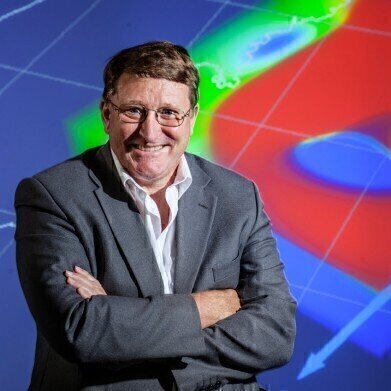-
 Dr Mike Ashworth, Head of Application Performance Engineering at STFC’s Scientific Computing Department. Credit:STFC
Dr Mike Ashworth, Head of Application Performance Engineering at STFC’s Scientific Computing Department. Credit:STFC
News & Views
Software to drive Exascale Supercomputers under Evaluation
Oct 13 2015
As part of a major £960k project funded by the Engineering and Physical Sciences Research Council (EPSRC), researchers from Queen’s University Belfast and the University of Manchester are creating ground-breaking computer software that will increase the ability of future supercomputers to model and simulate incredibly complex systems. Now being tested, evaluated and optimised for use by computational scientists at the Science and Technology Facilities Council’s (STFC) Daresbury Laboratory, at Sci-Tech Daresbury in Cheshire, the new software is said to be critical to drive Exascale supercomputers that would be capable of performing 1,000,000,000,000,000,000, or one billion, billion calculations per second. This is a thousand times more powerful than the Chinese Tianhe1A – the fastest supercomputer in operation today.
Dr Mike Ashworth, Head of Application Performance Engineering at STFC’s Scientific Computing Department, said: “Our next generation of supercomputers will enable scientists to tackle challenges that seem impossible today, such as detailed simulation of the whole Earth system and of the human brain. As well as tackling big global challenges, they are becoming absolutely crucial to industry for breakthroughs in faster and cheaper development of new products and materials. I am very excited that STFC’s world leading expertise in software development is playing a key role in enabling our collaborators to develop this next-generation software, which will be vital for tomorrow’s exascale systems.”
The project’s Principal Investigator, Professor Dimitrios Nikolopoulos from the School of Electronics, Electrical Engineering and Computer Science at Queen’s University Belfast, said: “Software that exploits the capability of Exascale systems means that complex computing simulations which would take thousands of years on a desktop computer will be completed in a matter of minutes. This research has the potential to give us insights into how to combat some of the biggest issues facing humanity at the moment.”
Digital Edition
LMUK 49.7 Nov 2024
November 2024
News - Research & Events News - News & Views Articles - They’re burning the labs... Spotlight Features - Incubators, Freezers & Cooling Equipment - Pumps, Valves & Liquid Hand...
View all digital editions
Events
Nov 18 2024 Shanghai, China
Nov 20 2024 Karachi, Pakistan
Nov 27 2024 Istanbul, Turkey
Jan 22 2025 Tokyo, Japan
Jan 22 2025 Birmingham, UK



.jpg)














